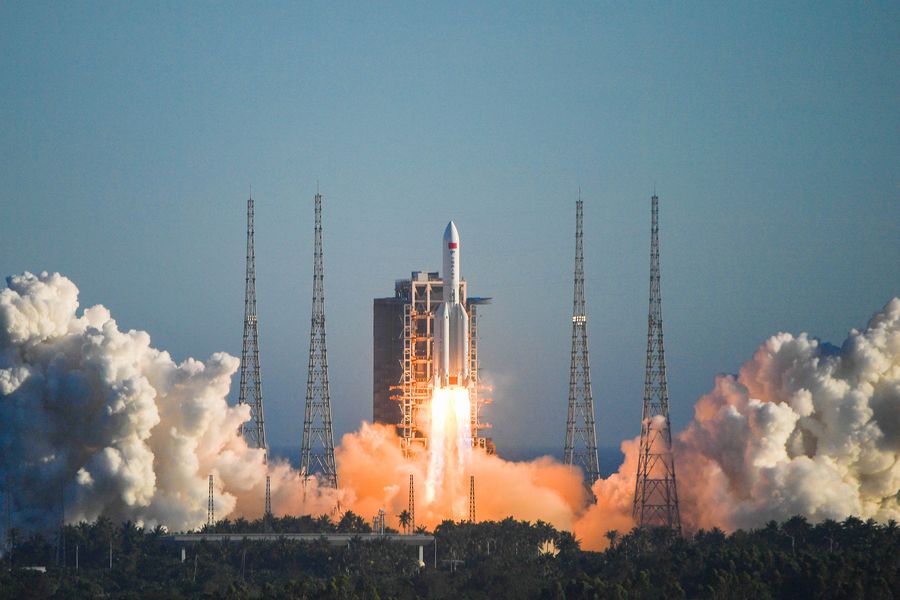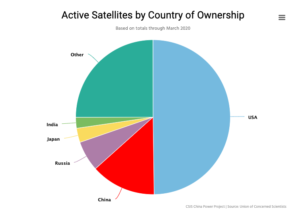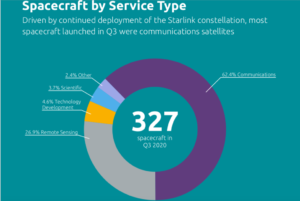By THERESA HITCHENS

WASHINGTON: China has launched more satellites than any other country this year as of Sept. 30, according to a report by Bryce Space and Technology. This puts China on track to win the space launch-rate race three years in a row.
Through the third quarter of 2020, China has launched a total of 29 satellites. (We added up the totals using Bryce’s first, second and new third quarter reports.) In the third quarter alone, China launched 14 sats.
The US by contrast has launched 27 total, launching 10 this quarter. If it wasn’t for commercial firm SpaceX — which primarily has been launching its own Starlink constellation designed to provide world-wide Internet from space — the US would be far behind China. In fact, SpaceX, with 15 total launches, is second only to China’s state-owned China Aerospace Science and Technology Corporation (CASC), which has sent 25 rockets into space, as the most active launch provider so far this year, Bryce has found.
Russia comes in a distant third behind the other two major space powers, having launched only eight sats through the end of September.
However, while China is launching at a higher rate than other countries, the PRC suffers a higher rate of launch failure than most other launching states, according to a study by the Center for Strategic and International Studies (CSIS). The study, How is China Advancing its Space Launch Capabilities, note that: “Although China has made great strides in developing its capabilities, its overall launch and payload tallies lag those of more established space powers like the US.”
According to the German satellite tracking blog Gunter’s Space Page, China’s launches this year include six Yaogan-30 satellites. China characterizes the Yaogan-30s as remote sensing satellites, but they are widely believed by Western experts to be PLA-owned reconnaissance birds. The most recent Yaogan-30 launch took place on Oct. 26, adding three more satellites to the constellation to make a total of 21 orbiting in Low Earth Orbit (LEO) at about 600 kilometers above the Earth.

SOURCE: Center for Strategic & International Studies (CSIS) graphic from Union of Concerned Scientists (UCS) data
“The PLA … has launched a number of what are probably [Electro-optical] satellites with Yaogan designations. The Yaogan-28 was launched in November 2015 and at least two of the Yaogan-30 series satellites launched in 2016/2017 are believed to carry EO payloads,” says the China Space and Counterspace Activities report released in May by the U.S.-China Economic and Security Review Commission. Other experts suggest that the satellites may be signals intelligence (SIGINT) sats designed to track ships using radio signals.
China led the world in launches last year, with 32 successful launches, and again in 2018, with a whopping 38 launches, according to the CSIS study, which was published Nov. 5, 2019 but was updated in August.
While China may be launching at a faster rate than any other country it lags far behind in the number of US satellites in space. According to the Union of Concerned Scientists Satellite Database, there are a total of 2,787 active satellites on orbit — the US owns/operates 1,425; China, 382; and Russia, 172 as of Aug. 1.
The Bryce report also shows that commercial communications satellite dominate the launch market, followed by commercial remote sensing satellites. The preponderance of these were small satellites in Low- or Medium-Earth Orbit.

Of the 327 satellites launched by all nations in the third quarter, 273 were commercial satellites versus only 11 military satellites. (Bryce doesn’t break out types of satellite by country of launch.)
This reflects the continued growth of the commercial satellite market begun about a decade ago. The overall global space economy hit $366 billion in revenue in 2019, with the commercial industry dominating the market, according to the 2020 State of the Satellite Industry report published by the Satellite Industry Association (SIA). Commercial satellite industry revenue was $271 billion in 2019, accounting for almost 75 percent of global space business. The US accounted for $114 billion, about 42 percent.
No comments:
Post a Comment